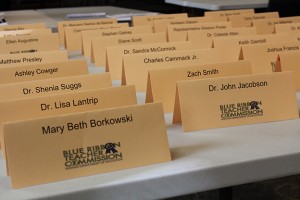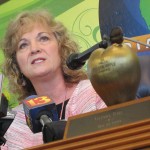Statewide Panel Begins To Identify Teacher Shortage Fixes
With help from the wider school community, Indiana education officials are making some headway in identifying potential solutions for the state’s so-called “teacher shortage.”

Members of Indiana’s Blue Ribbon Commission will meet twice more before the 2016 legislative session begins. (Photo Credit: Rachel Morello/StateImpact Indiana)
State Superintendent Glenda Ritz reconvened with members of her 2015 Blue Ribbon Commission Thursday to reflect on discussions from previous meetings and begin the process of turning those ideas into actions.
During a series of gatherings at the Statehouse in Indianapolis, educators, key stakeholders and legislators from around Indiana have studied local and national data with the ultimate goal of developing strategies to recruit and retain excellent teachers throughout the state.
By Thursday, the group identified 10 top possible strategies for responding to the state’s issues for teacher recruitment and retention:
- Mentoring
- Compensation
- Positive press
- Career options/ladder and leadership opportunities/support for teachers
- Streamline, pare down and clarify role of standardized tests
- Revise teacher evaluations
- Recognize and support teachers’ ongoing learning
- Offset costs of preparation programs
- Clinical experiences for teacher candidates
- Revise professional development
Commission members broke up into groups Thursday to workshop actionable plans around each of these approaches.
Vickie Thomas, master teacher in the School City of Hammond district, participated in a small group that specifically discussed ideas for improving professional development statewide. She says she felt this meeting had more meat than in the past.
“I felt like we got to flesh it out,” Thomas says. “In the past, the meetings have been, ‘Let’s think about it.’ Today, I felt like we kind of bridged that gap. Now we’re going to be able to say it in a way that maybe others will understand that are outside of education.”
“Today felt kind of empowering to me, like I really may be making a difference,” she adds.
Thomas and her colleagues suggested looking into what professional development activities might look like in different districts. Other ideas included expanding on an existing recruitment strategy at Butler University called “tapping,” which identifies students from various subject areas who might also make great teaching candidates.
Superintendent Ritz says she was pleased with the “awesome conversation” and “unique ideas” the group brought forth.
“I think what I loved the most is that people were thinking in a systematic way,” Ritz says. “They really were starting to say, ‘Hey, if we want to keep our teachers and we want to recruit our teachers, what does this system look like?’” The Blue Ribbon Commission meets twice more before year’s end to finalize their work – and hopefully a legislative plan. The focus for these meetings on Nov. 16 and Dec. 7 is to develop an agenda for presentation during the 2016 legislative session.
Ritz says she envisions her panel will bring forth a few different strategies, but doesn’t anticipate all will require legislative action.
“Today’s work was really solidifying amongst ourselves, this is important work underneath this topic,” Ritz says. “The next [meeting] is probably going to be the meat and potatoes of things, where you’re actually going to put down the action steps, how do we get it into the system, and looking at the barriers and what’s in the way.”
Select members of the General Assembly meet Monday to discuss the teacher shortage issue as part of the Interim Study Committee on Education.
